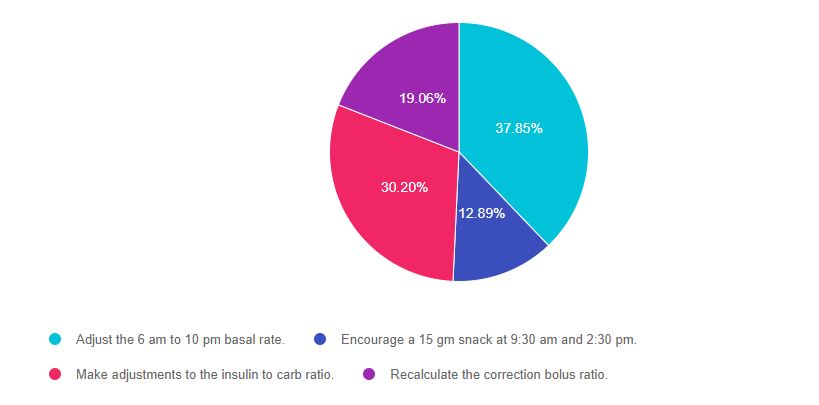
Our September 22nd Question of the week explored making adjustments in insulin pump therapy to prevent hypoglycemia. 38% of respondents chose the correct answer, while 62% did not. We thought that this was an important topic to discuss further, so we can pass on correct info to people living with diabetes.
Before we start though, if you don’t want any spoilers and haven’t tried the question yet, you can answer below: Answer Question
Question: AR is a 39-year-old on an insulin pump and CGM. AR’s basal rates are:
- 1.7 units from 10 pm to 6 am and
- 1.6 units from 6 am to 10 pm.
AR’s insulin to carb ratio is 1:15 and the correction is 1:50 with a blood sugar target 100-120.
When looking at AR’s report, they are bolusing for meals at 7 am, noon and 7 pm. AR is experiencing blood sugars of 60 -70 around 10 am and 3 pm every day.
Based on this data, what is the best recommendation?
Answer Choices:
- Adjust the 6 am to 10 pm basal rate.
- Encourage a 15 gm snack at 9:30 am and 2:30 pm.
- Make adjustments to the insulin to carb ratio.
- Recalculate the correction bolus ratio.

As shown above, the most common choice was option 1, the second most common answer was option 3, then option 4, and finally option 3.
Getting to the Best Answer
If you are thinking about taking the certification exam, this practice test question will set you up for success. Test writers anticipate possible answers based on the details in the question. They will wave those “juicy answers” right under your nose. Your job is to weed through the particulars, pluck out the most important elements and choose the BEST answer.
Answer 1 is correct. 38% chose this answer. “Adjust the 6 am to 10 pm basal rate.” This is the best answer. When someone is on an insulin pump, the basal insulin is being delivered 24 hours a day. If blood sugars are dropping in-between meals or through the night, too much basal insulin is the usual culprit. People with this problem might complain of having to eat frequently throughout the day to prevent or treat hypoglycemic events. We could describe this as “feeding the insulin” which leads to unwanted weight gain. The goal of insulin therapy is to take the least amount of insulin needed to manage blood sugars. Over insulinization leads to weight gain and hypoglycemia.
Answer 2 is incorrect. 13% of you chose this answer. “Encourage a 15 gm snack at 9:30 am and 2:30 pm”. This is not the best answer because we want to focus on PREVENTING hypoglycemia instead of chasing after it. This is best accomplished by decreasing the insulin delivered.
Answer 3 is incorrect. About 30% of respondents chose this. “Make adjustments to the insulin to carb ratio.” Although this answer is tempting, it is not the best answer. These low blood sugars are occurring over 3 hours after eating and taking bolus insulin to cover for carbs. If AR was taking too much insulin to cover carbs, we would expect a low blood sugar closer to the meal time. Since it is 3 hours post-meal and bolus, basal insulin is more suspect. However, if we reduce the basal rate between 6 am to 10 pm and the person is still getting low blood sugars three hours post-meal, we could certainly reconsider adjusting the insulin-to-carb ratio.
Finally, Answer 4 is incorrect. 19% chose this answer. “Recalculate the correction bolus ratio”. Although this is another tempting answer, we don’t’ have enough information in the vignette question to choose this answer. The question doesn’t say, for example, at breakfast the blood sugar was 202, so AR took 2 units to correct plus insulin for carbs. We can only base our answer on the information provided in the question.
We had over 1000 people take this practice test question. We sure appreciate your participation and enthusiasm!
Want to learn more pumps, sensors, and calculations?
Enroll in our Technology Toolkit

Due to technical difficulty during our July 21st course, we are re-recording session 1 and adding a new date for session 2. We apologize in advance for the inconvenience and we appreciate your patience.
Tech 101 – Pumps and Sensors Update and Overview
Join Coach Beverly for an overview of the complex world of insulin pumps and continuous glucose monitors. This webinar will discuss the features of available technologies, basic functions and how to integrate these into our practice. We will discuss the benefits, considerations and critical information to share with clients and providers.
Tech 102 – Insulin Pump Calculations; From basal to square bolus
Determining basal and bolus rates for insulin pumps can seem overwhelming. This course provides participants with a step-by-step approach to determine basal rates, bolus ratios and how to problem solve when blood glucose levels aren’t on target. Included is a discussion on DKA recognition and an explanation of the safe use of technology in the hospital setting.
Sign up for Diabetes Blog Bytes – we post one daily Blog Byte from Monday to Friday. And of course, Tuesday is our Question of the Week. It’s Informative and FREE! Sign up below!
[yikes-mailchimp form=”1″]Accreditation: Diabetes Education Services is an approved provider by the California Board of Registered Nursing, Provider 12640, and Commission on Dietetic Registration (CDR), Provider DI002. Since these programs are approved by the CDR it satisfies the CE requirements for the CDCES regardless of your profession.*
The use of DES products does not guarantee the successful passage of the CDCES exam. CBDCE does not endorse any preparatory or review materials for the CDCES exam, except for those published by CBDCE.
[yikes-mailchimp form=”1″]







